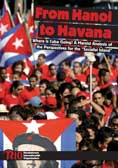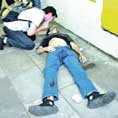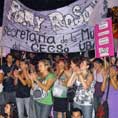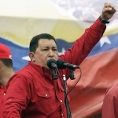



Archive for the Category 'Latin America'

 Cuba’s economy has seen a certain stabilization since 1999 when Venezuela began shipping cheap oil in exchange for Cuban doctors. This made it possible for the government to de-dolarize the economy, introducing the convertible peso in 2004. However, to this day, two currencies exist in Cuba: the “normal” peso paid to state workers and the convertible peso, pegged to the dollar, which is available from remittances, tourists etc. »»»»
Cuba’s economy has seen a certain stabilization since 1999 when Venezuela began shipping cheap oil in exchange for Cuban doctors. This made it possible for the government to de-dolarize the economy, introducing the convertible peso in 2004. However, to this day, two currencies exist in Cuba: the “normal” peso paid to state workers and the convertible peso, pegged to the dollar, which is available from remittances, tourists etc. »»»»
 read comments (0)
read comments (0)
 In the mid 1980s, the Cuban leadership introduced a campaign of rectificación and recentralization of the economy. Going against the zeitgeist of Michail Gorbatchov’s Perestroika programm, this might have saved the Cuban system from complete collapse when the Council for Mutual Economic Assistance fell apart and with it a big part of Cuba’s foreign trade[20]. The response to this was the “Special Period in Times of Peace”, which began on July 26, 1990. By 1993, Cuba’s GDP had sunk by 30% – oil imports even by 70%[21]. »»»»
In the mid 1980s, the Cuban leadership introduced a campaign of rectificación and recentralization of the economy. Going against the zeitgeist of Michail Gorbatchov’s Perestroika programm, this might have saved the Cuban system from complete collapse when the Council for Mutual Economic Assistance fell apart and with it a big part of Cuba’s foreign trade[20]. The response to this was the “Special Period in Times of Peace”, which began on July 26, 1990. By 1993, Cuba’s GDP had sunk by 30% – oil imports even by 70%[21]. »»»»

 Cuba’s system fits in with Leon Trotsky’s analysis of a degenerate workers’ state: a society in which the private property of the means of production has been abolished (a precondition for the transition to socialism) but in which a privileged bureaucracy controls all political and economic institutions and suppresses all independent activity by the masses. Therefore, the transition to socialism – the withering away of the state as the working population increasingly takes over all tasks of administration – is blocked. And as a result, the whole system tends to slide back to capitalism. »»»»
Cuba’s system fits in with Leon Trotsky’s analysis of a degenerate workers’ state: a society in which the private property of the means of production has been abolished (a precondition for the transition to socialism) but in which a privileged bureaucracy controls all political and economic institutions and suppresses all independent activity by the masses. Therefore, the transition to socialism – the withering away of the state as the working population increasingly takes over all tasks of administration – is blocked. And as a result, the whole system tends to slide back to capitalism. »»»»

 Cuba has never been a socialist society in which the working class manages the means of production democratically. Cuba has never seen any kid of proletarian democracy: no kind of workers’ and peasants’ councils with elected and recallable delegates, similar to the Soviet system established by the October Revolution in Russia and subsequently crushed by the Stalinist counterrevolution of the 1920s/30s. The Cuban bureaucracy had no need to carry out a political counterrevolution to crush organs of proletarian democracy because such organs simply did not exist: from the beginning it based itself on the Bonapartist state apparatus established before the expropriation of the bourgeoisie. “Castro, who in 1959 was a bonaparte for the enfeebled Cuban bourgeoisie was, by 1962, a bonaparte “for” the politically expropriated Cuban working class.”[12] »»»»
Cuba has never been a socialist society in which the working class manages the means of production democratically. Cuba has never seen any kid of proletarian democracy: no kind of workers’ and peasants’ councils with elected and recallable delegates, similar to the Soviet system established by the October Revolution in Russia and subsequently crushed by the Stalinist counterrevolution of the 1920s/30s. The Cuban bureaucracy had no need to carry out a political counterrevolution to crush organs of proletarian democracy because such organs simply did not exist: from the beginning it based itself on the Bonapartist state apparatus established before the expropriation of the bourgeoisie. “Castro, who in 1959 was a bonaparte for the enfeebled Cuban bourgeoisie was, by 1962, a bonaparte “for” the politically expropriated Cuban working class.”[12] »»»»

 The Cuban Revolution began in 1917 with the October Revolution in Russia. During the first imperialist World War, the Russian working class, together with the poor peasantry, did not only overthrow the Czarist monarchy but also broke the power of the propertied classes. Led by the revolutionary workers’ party known as the Bolsheviks, the workers’ and peasants’ councils carried out a land reform without any compensation to the former owners and nationalized the industry under workers’ control. »»»»
The Cuban Revolution began in 1917 with the October Revolution in Russia. During the first imperialist World War, the Russian working class, together with the poor peasantry, did not only overthrow the Czarist monarchy but also broke the power of the propertied classes. Led by the revolutionary workers’ party known as the Bolsheviks, the workers’ and peasants’ councils carried out a land reform without any compensation to the former owners and nationalized the industry under workers’ control. »»»»

 When the guerilla assumed power, its program was based on the utopian vision of an independent Cuban capitalism, including a land reform to give land to poor peasants and decrease US influence in agriculture. Castro famously declared that the revolution was “not red but olive green” and in a visit to the United States in April 1959, he went even further: “I have said clearly and definitively that we are not communists. The doors are open to private investments that contribute to the development of industry in Cuba. It is absolutely impossible for us to make progress if we don’t reach an understanding with the USA.”[7] »»»»
When the guerilla assumed power, its program was based on the utopian vision of an independent Cuban capitalism, including a land reform to give land to poor peasants and decrease US influence in agriculture. Castro famously declared that the revolution was “not red but olive green” and in a visit to the United States in April 1959, he went even further: “I have said clearly and definitively that we are not communists. The doors are open to private investments that contribute to the development of industry in Cuba. It is absolutely impossible for us to make progress if we don’t reach an understanding with the USA.”[7] »»»»

 Cuba was historically dominated by imperialism, first as a colony of Spain and then as a semi-colony of the United States. The island gained independence in 1902, but the Cuban constitution included an amendment granting the United States the right to intervene militarily at any time until 1934. The political power of US imperialism had an economic foundation, since US companies owned a large part of Cuba’s land and industry. For example, US capital owned 35% of sugar production, alongside countless hotels and casinos, while the rest of the economy belonged to a small and slavishly pro-imperialist Cuban bourgeoisie[4]. »»»»
Cuba was historically dominated by imperialism, first as a colony of Spain and then as a semi-colony of the United States. The island gained independence in 1902, but the Cuban constitution included an amendment granting the United States the right to intervene militarily at any time until 1934. The political power of US imperialism had an economic foundation, since US companies owned a large part of Cuba’s land and industry. For example, US capital owned 35% of sugar production, alongside countless hotels and casinos, while the rest of the economy belonged to a small and slavishly pro-imperialist Cuban bourgeoisie[4]. »»»»

 Cuba seems like an anachronism in today’s world. Other formerly “socialist” states reintroduced capitalism in the upheavals of the 1990s. In Russia, the Communist Party was toppled and its system collapsed. In China and Vietnam, the Communist Parties themselves led a controlled process of reforms to reestablish a market economy. Cuba alone has maintained to this day an economy which is dominated not by the laws of the market but by a plan[1]. »»»»
Cuba seems like an anachronism in today’s world. Other formerly “socialist” states reintroduced capitalism in the upheavals of the 1990s. In Russia, the Communist Party was toppled and its system collapsed. In China and Vietnam, the Communist Parties themselves led a controlled process of reforms to reestablish a market economy. Cuba alone has maintained to this day an economy which is dominated not by the laws of the market but by a plan[1]. »»»»

 Buenos Aires ++ Violent clashes between strike activists and the trade union bureaucracy ++ 23-year-old activist murdered by thugs hired by the trade union bureaucracy ++
Buenos Aires ++ Violent clashes between strike activists and the trade union bureaucracy ++ 23-year-old activist murdered by thugs hired by the trade union bureaucracy ++
The conflict over the reincorporation of fired and subcontracted workers on the Roca train line in southern Buenos Aires, which has been going on for more than eight months, gained a shocking new quality yesterday. During a protest in the neighborhoods of Avellaneda and Barracas, in which precarious train workers participated alongside militants of different left-wing groups, violent clashes erupted between the protesters and a group of thugs hired by the Unión Ferroviaria (Railroad Union, UF) to prevent the protests. While only rocks were used at the beginning, later at least two of the provocateurs hired by the UF bureaucracy under José Pedraza pulled out guns and shot at the protesters. The 23-year-old student Mariano Ferreyra, militant of the Partido Obrero (PO, “Workers’ Party”), was shot dead and three more protesters were gravely injured; a 56-year-old militant (also PO) is still in mortal danger. »»»»

 The radical left in Argentina is organizing a demonstration in Buenos Aires for international women’s day. An interview with Andrea D’Atri, spokeswoman for the Argentinean women’s organization “Pan y Rosas (Bread and Roses), connected with the “Partido de Trabajadores Socialistas” (Socialist Workers’ Party). »»»»
The radical left in Argentina is organizing a demonstration in Buenos Aires for international women’s day. An interview with Andrea D’Atri, spokeswoman for the Argentinean women’s organization “Pan y Rosas (Bread and Roses), connected with the “Partido de Trabajadores Socialistas” (Socialist Workers’ Party). »»»»

 How should socialists react to the call by Hugo Chávez for a Fifth International?
How should socialists react to the call by Hugo Chávez for a Fifth International?
At an international meeting of left-wing parties in Caracas on November 21, the Venezuelan president Hugo Chávez Frias called for the formation of a “Fifth International”. How should socialists react to this call? We want to use the opportunity to contribute to the debate about what kind of organization is necessary in the fight against capitalism. We believe the first step is to analyze the social forces and the political program behind Chávez’ call. »»»»
